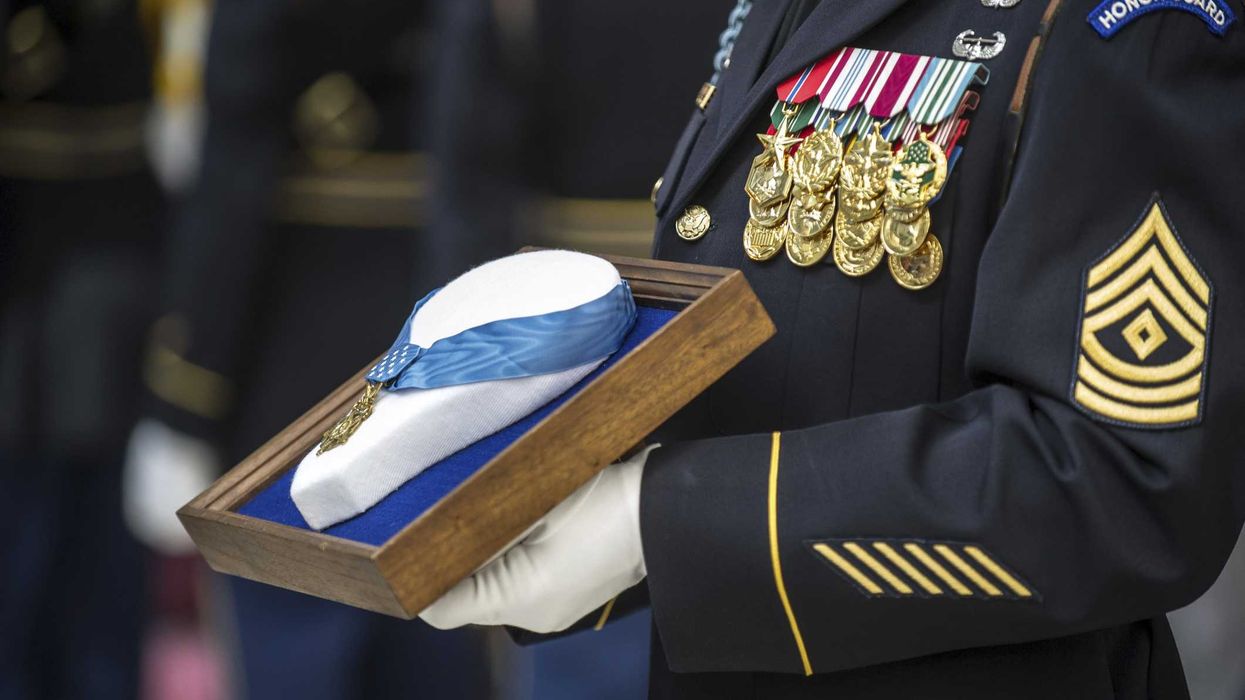Should the U.S. soldiers at 1890’s Wounded Knee keep the Medal of Honor?
Context: history
Throughout the 19th century, the U.S. military engaged in violent conflicts with Native Americans, many of them armed uprisings, as white people settled native land. On December 29, 1890, a large party from the Lakota tribe made camp by a South Dakota creek called Wounded Knee. Hundreds of Army soldiers surrounded the group, attempting to disarm them.
A shot rang out. Though the exact circumstances are murky, it’s believed a deaf Lakota man named Black Coyote refused to surrender his weapon, which went off accidentally. A violent melee ensued – but since most of the Lakota had surrendered their weapons by that point, they were left largely defenseless. While at least 25 U.S. soldiers died during the battle, hundreds of Lakota people died, including women and children.
In the aftermath, 20 U.S. soldiers were bestowed the Medal of Honor, the nation’s top military prize.
Context: today
In July 2024, President Joe Biden’s Defense Secretary Lloyd Austin announced a commission to review those medals, with their recommendations and report due to him by that October. However, this report was never publicly released.
Austin ultimately took no action on the medals during his time in office – neither rescinding them as many predicted he would, nor affirmatively maintaining them. As a result, the medals remain intact.
In September 2025, President Donald Trump’s Defense Secretary Pete Hegseth revealed the panel had voted nearly a year prior to recommend upholding the medals.
While the actual report has still not been publicly released, one of the commission’s five members told South Dakota Searchlight that the recommendation vote was 3-2. Reportedly, Defense Department members provided the three votes to maintain the medals, while members of the Interior Department (which helps manage tribal lands) provided the two votes to rescind.
Hegseth then announced he accepted the panel’s recommendations and affirmatively kept the medals intact. He declared his decision “final,” meaning the medals would never be rescinded by him… but Congress still could.
What the legislation does
The Remove the Stain Act would posthumously rescind the Medal of Honor for any Wounded Knee participant who previously received the award.
Sen. Elizabeth Warren (D-MA) introduced the Senate version on May 22, then Rep. Jill Tokuda (D-HI2) introduced the House version a day later on May 23. That was several months before Hegseth’s announcement, but in anticipation of its possibility.
Is this even allowed?
Indeed, hundreds of Medals of Honor have been rescinded before.
The most famous case might be Mary Edwards Walker, the only woman ever awarded the Medal of Honor. President Andrew Johnson bestowed the prize upon her in 1865 for saving dozens of soldiers’ lives while working at a Civil War hospital. But in 1917, Congress retroactively changed the criteria, saying medals could only go to those who’d served in combat.
Walker, still alive in her 80s, saw her prize officially revoked but refused to return her actual physical medal. President Jimmy Carter posthumously reinstated her award in 1977.
What supporters say
Supporters argue that the 1890 event was an unjustified butchery.
“The massacre of hundreds of unarmed Lakota men, women, and children at Wounded Knee was a crime against humanity. Honoring the perpetrators with the Medal of Honor adds insult to that deep wound,” Rep. Tokuda said in a press release. “[The bill would] revoke medals that should never have been given, because healing begins with honesty — and the Lakota people deserve nothing less.”
"We cannot be a country that celebrates and rewards horrifying acts of violence against native people," Sen. Warren said in a separate press release. "Congress must recognize how shameful this massacre was and take an important step toward justice for the Lakota people."
What opponents say
Opponents counter that the soldiers in 1890 were under attack and defended themselves valiantly, with 25 of them losing their lives.
Sec. Austin “was more interested in being politically correct than historically correct,” Sec. Hegseth said in a social media video announcing his decision, which earned 29+ million views on X/Twitter. “[Austin] chose not to make a final decision. Such careless inaction has allowed for their distinguished recognition to remain in limbo, until now.”
“Under my direction, we’re making it clear without hesitation that the soldiers… will keep their medals. And we’re making it clear that they deserve those medals,” Hegseth continued. “Their place in our nation’s history is no longer up for debate. We salute their memory, we honor their service, and we will never forget what they did.”
Odds of passage
The Senate version has attracted seven cosponsors, all Democrats or Democratic-leaning independents. The House version has attracted eight Democratic cosponsors. Either version awaits a potential vote in their respective chamber’s Armed Services Committee, both controlled by Republicans.
Several prior versions introduced starting in 2019 never received a committee vote, not even when Democrats controlled one or both chambers of Congress.
Jesse Rifkin is a freelance journalist with The Fulcrum. Don’t miss his report, Congress Bill Spotlight, on The Fulcrum. Rifkin’s writings about politics and Congress have been published in the Washington Post, Politico, Roll Call, Los Angeles Times, CNN Opinion, GovTrack, and USA Today.
SUGGESTIONS:
Congress Bill Spotlight: The Charlie Kirk Act
Congress Bill Spotlight: Department of War Restoration Act




















